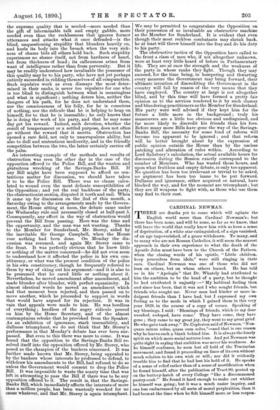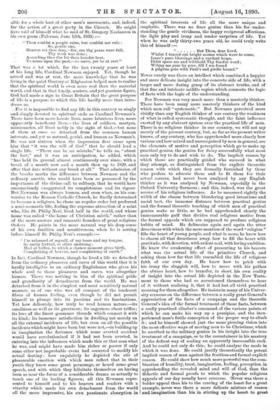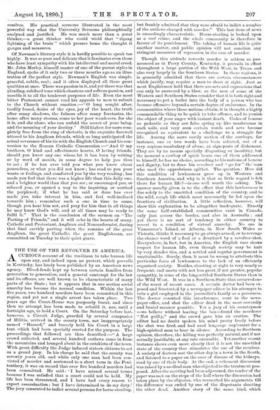CARDINAL NEWMAN. T HERE are deaths yet to come which will
agitate the English world more than Cardinal Newman's ; but there has been none, and will be none, so far as we know, that will leave the world that really knew him with so keen a sense of deprivation, of a white star extinguished, of a sign vanished, of an age impoverished, of a grace withdrawn. To many, and to many who are not Roman Catholics, it will seem the nearest approach in their own experience to what the death of the Apostle John must have been to the Church of the Fathers, when the closing words of his epistle, " Little children, keep yourselves from idols," were still ringing in their ears. Cardinal Newman was one of those who did not lean on others, but on whom others leaned. He has told us in his " Apologia" that Dr. Whately had attributed to him the ambition to be the head of a party, but he thought he had attributed it unjustly :—" My habitual feeling then and since has been, that it was not I who sought friends, but friends who sought me. Never man had kinder or more in- dulgent friends than I have had, but I expressed my own feeling as to the mode in which I gained them in this very year 1829, in the coarse of a copy of verses. Speaking of my blessings, I said: Blessings of friends, which to my door unasked, unhoped, have come.' They have come, they have gone ; they came to my great joy, they went to my great grief. He who gave took away." Dr. Copleston said of Newman, " Nun- quam minus solus, quam cum solus,"—and that is one reason
why he leaves such a blank behind him. It is always the lonely spirit on which more social natures lean. And yet Newman was quite right in saying that ambition was never his weakness. As he himself confesses, he soon lost all hold of the Tractarian movement, and found it proceeding on lines of its own without much relation to his own wish or will ; nor did it evidently trouble him to find that he had lost his hold of it. He speaks of a sense of relief rather than of a sense of mortification when
he found himself, after the publication of Tract 90, posted up
on the buttery-hatch of every College " like a discommoned pastry-cook." He found it hard enough to make out whither
he himself was going ; but it was a much easier inquiry, and one less embarrassed by all sorts of moral perplexities, than it had been at the time when he felt himself more or less respon-
sible for a whole host of other men's movements, and, indeed, for the action of a great party in the Church. He might
lave said of himself what he said of St. Gregory Nazianzen in his own poem (Palermo, June 12th, 1833) :—
"Thou couldst a people raise, but couldst not rule : So, gentle one, Heaven set thee free,—for, ere thy years were full, - Thy work was done ; According thee the lot thou lovedst best, To muse upon the past, —to serve, yet be at rest."
That was a lot which, for the last twenty years at least of his long life, Cardinal Newman enjoyed. Yet, though he served and was at rest, the mere knowledge that he was living in the quiet Oratory at Edgbaston helped men to realise that the spiritual world is even more real than the material world, and that in that lonely, austere, and yet gracious figure, God had made a sign to Great Britain that the great purpose of life is a purpose to which this life hardly more than intro- duces us.
..For it is impossible to find any life in this century so singly and simply devoted to spiritual ends as Cardinal Newman's. There have been more heroic lives, more laborious lives, more apparently beneficent lives,—the lives of soldiers, martyrs, missionaries, all lived nobly in the sight of God,—bnt none of them at once so detached from the common human interests, and yet so natural, genial, and human as Newman's He was not sixteen when the impression first came upon him that "it was the will of God" that he should lead a single life. " There can be no mistake," he tells us, " about the fact," and it was an anticipation, he added, which " has held its ground almost continuously ever since, with a break of a month now and a month then up to 1829, and after that date without any break at all." That admission of the breaks marks the difference between Newman and the ordinary ascetic, who would have been so possessed by the importance of the divine call to celibacy, that he would have unconsciously exaggerated its completeness and its rigour. But Newman was always human, and even when, on his con- version to the Roman Catholic Church, he finally determined to become a religious, be chose no regular order but preferred a semi-monastic life, feeling the supreme attraction of a saint who, like St. Philip Neri, lived half in the world, and whose home was called " the home of Christian mirth," rather than of the more austere and romantic founders of great religious Orders. He paints in the most natural way his deep sense of his own frailties and sensitiveness, when he is setting before himself St. Philip Neri's example :— "I'm ashamed of myself, of my tears and my tongue, So easily fretted, so often unstrung ; Mad at trifles, to which a chance moment gives birth, Complaining of heaven, and complaining of earth."
In fact, Cardinal Newman, though he lived a life so detached from the ordinary pleasures and cares of this world that it is hardly intelligible to an ordinary Englishman who gives his whole soul to those pleasures and cares, was altogether human. There was nothing in him of the spiritual pride awl grandiosity of detachment from the world. He was detached from it in the simplest and most sensitively natural manner, as of one who was all compact of the tenderest fibres of human feeling, even though he did not permit liiinself to plunge into its passions and its fascinations.
Yet how delicately, how truly he read human nature,—its smallness as well as its greatness ; its eagerness about trifles; its love of the finest gossamer threads which connect it with its kind; its immense satisfaction in dwelling not merely on all the external incidents of life, but even on all the possible incidents which might have been but were not,—in building up in imagination the fortunes which some averted accident would have revolutionised if it had not been averted, in entering into the influences which made this or that man what he' was, and might have made him richer or poorer if only some other not improbable event had occurred to modify his actual destiny ; how exquisitely he depicted the stir of pleasurable emotion with which men reflect that in their youth they knew some great personage, or heard some great speech, and with which they feliollate themselves on having been so near the focus of a considerable drama as actually to touch one of its leading figures ; all this Newman repre- sented to himself and to his hearers and readers with a vivacity which made his own detachment from the world all the more impressive, his own passionate absorption
the spiritual interests of life all the more unique and emphatic. There was no finer genius thin his for ,under-
standing the gentle vividness, the happy reciprocal affections, the light play and irony and tender surprises of life. Yet when he was only thirty-two years old, he could truly write this of himself :— But Thou, dear Lord, Whilst I traced out bright scenes which were to come, Isaac's pure blessings and a verdant home, Didst spare me and withhold Thy fearful word; Wiling me year by year, till I am found A pilgrim pale with Paul's sad girdle bound."
Never surely was there an intellect which combined a happier and more delicate insight into the concrete side of life, with a larger and more daring grasp of its abstract truths, and of that fine and intricate middle region which connects the logic of facts with the logic of the understanding.
For Newman was very much more than a masterly thinker. There have been many more masterly thinkers of the kind which men call " systematic." But Newman perceived more vividly than any English thinker of our century the weakness of what is called systematic thought, and the faint influence exerted by any abstract system over the practical life of men. There is no religious thinker in our country, we will not say merely of the present century, but, so far as the present writer knows, of any century, who has apprehended more clearly how various and how mixed and unrecognised by men in general, are the elements of motive and perception which go to make up practical genius, the genius for doing successfully what most men only try to do and wish to do. The implicit reason by which those are practically guided who succeed in what they attempt, as distinguished from the explicit theoretic reason with which they are formally furnished by those who profess to educate them and to fit them for their actual careers, had never been analysed by any English thinker as it was analysed by Newman, especially in the Oxford University Sermons ; and this, indeed, was the great source of his religious influence. As he measured rightly the width of the chasm between blundering good intentions and social tact, the immense distance between practical genius and the formal theoretic teaching of which men of practical genius make so little, so he had apprehended clearly the immeasurable gulf that divides real religious motive from the formal appeals which are supposed to produce religious habits of mind. He delineates again and again the utter dreariness with which the mere mention of the word " religion " fills the heart of young people, and what is more, he knew how to charm all that dreariness away, how to fill the heart with gratitude, with devotion, with ardent zeal, with loving ambition. He knew the awakening effect of presenting to his hearers what was the actual life of the primitive Church, and asking them how far that life resembled the life of religious faith of our own day. He knew how to prick with his irony the sluggish will, how to move with his pathos the obtuse heart, how to transfer, in short, his own reality of insight into the actual life depicted in the New Testa- ment to those who had so accustomed themselves to hear of it without realising it, that it had lost all vivid practical meaning for them altogether. He insists in many of his Univer- sity sermons on the difference between a really great General's appreciation of the facts of a campaign and the theoretic General's idea of the formal treatment of those facts, between a really practised climber's command of the various points at which he can make his way up a precipice, and the inex- perienced man's futile conception of the proper way to climb it; and he himself showed just the same piercing vision into" the most effective ways of moving men to be Christians, which he ascribed to the military genius in his insight into the true treatment of a campaign, or to the mountaineer in his mastery of the deftest way of scaling an apparently inaccessible rock. And he could not only do this; he could analyse the mode in which it was done. He could justify theoretically the potent implicit reason of man against the fruitless and formal explicit • reason. He could show how much more powerful was the com- bination of humility, trust, imagination, feeling, perception, in apprehending the revealed mind and will of God, than the didactic and formal proofs to which the popular religious appeals of our day usually have recourse. *Never was there a bolder appeal than his to the craving of the heart for a great example, never was there a more delicate mixture of reason
And imagination than his in stirring up the heart to "great resolves. His practical sermons illustrated in the most powerful way what the University Sermons philosophically analysed and justified. He was much more than a great thinker,—a great thinker who could wield that. " zigzag lightning of the brain which presses home the thought it gauges and measures.
Of Newman's literary style it is hardly possible to speak too highly. It was so pure and delicate that it fascinates even those who have least sympathy with his intellectual and moral creed. Mr. John Morley, himself master of one of the purest styles in England, spoke of it only two or three months ago as an illus- tration of the perfect style. Newman's English was simple, graceful, subtle, real ; and it often displayed all these great qualities at once. There was passion in it, and yet there was that pleading, subdued tone which chastens and softens passion, and moulds it to all the tenderest purposes of life. Even the most bitter Protestant cannot read his appeals to men to submit to the Church without emotion :—" 0 long sought after, tardily found, desire of the eyes, joy of the heart, the truth after many shadows, the fulness after many foretastes, the home after many storms, come to her poor wanderers, for she it is, and she alone, who can unfold the secret of your being, and the meaning of your destiny." Still higher; for more com- pletely free from the ring of rhetoric, is the exquisite farewell uttered to his Anglican friends, which so long anticipated the actual severance of his tie with the English Church and his con- version to the Roman Catholic Communion :—" And 0 my brethren, 0 kind and affectionate hearts, 0 loving friends, should you know any one whose lot it has been by writing or by word of mouth, in some degree to help you thus to act ; if he has ever told you what you know about yourselves, or what you did not know; has read to you your wants or feelings, and comforted you by the very reading ; has made you feel that there was a higher life than this daily one, and a brighter world than that you see ; or encouraged you, or sobered you, or opened a way to the inquiring, or soothed the perplexed; if what he has said or done has ever made you take interest in him, and feel well-inclined towards him ; remember such a one in time to come, though you hear him not, and pray for him that in all things he may know God's will, and at all times may be ready to fulfil it." That is the conclusion of the sermon on " The Parting of Friends," and it will echo in the hearts of many, Catholic and Protestant, Anglican and Nonconformist, during that final earthly parting when the remains of the great Anglican, the great Catholic, the great Englishman, are committed on Tuesday to their quiet grave.




































 Previous page
Previous page